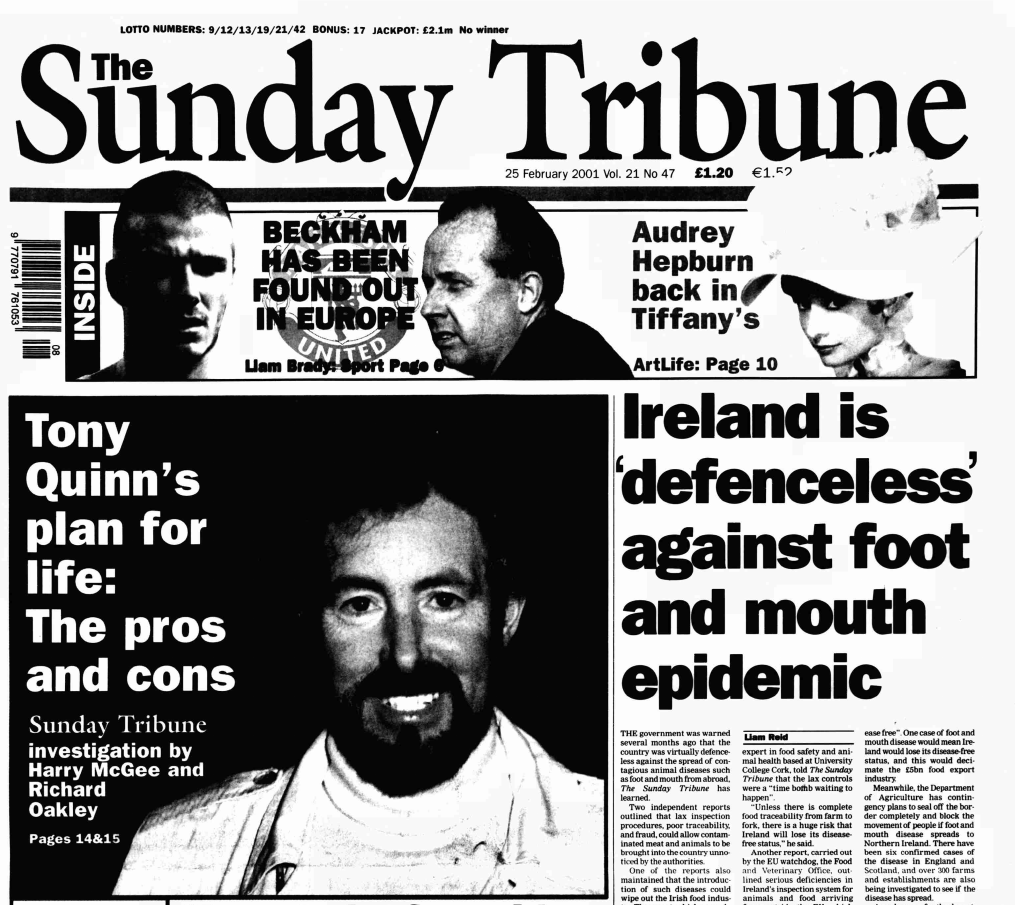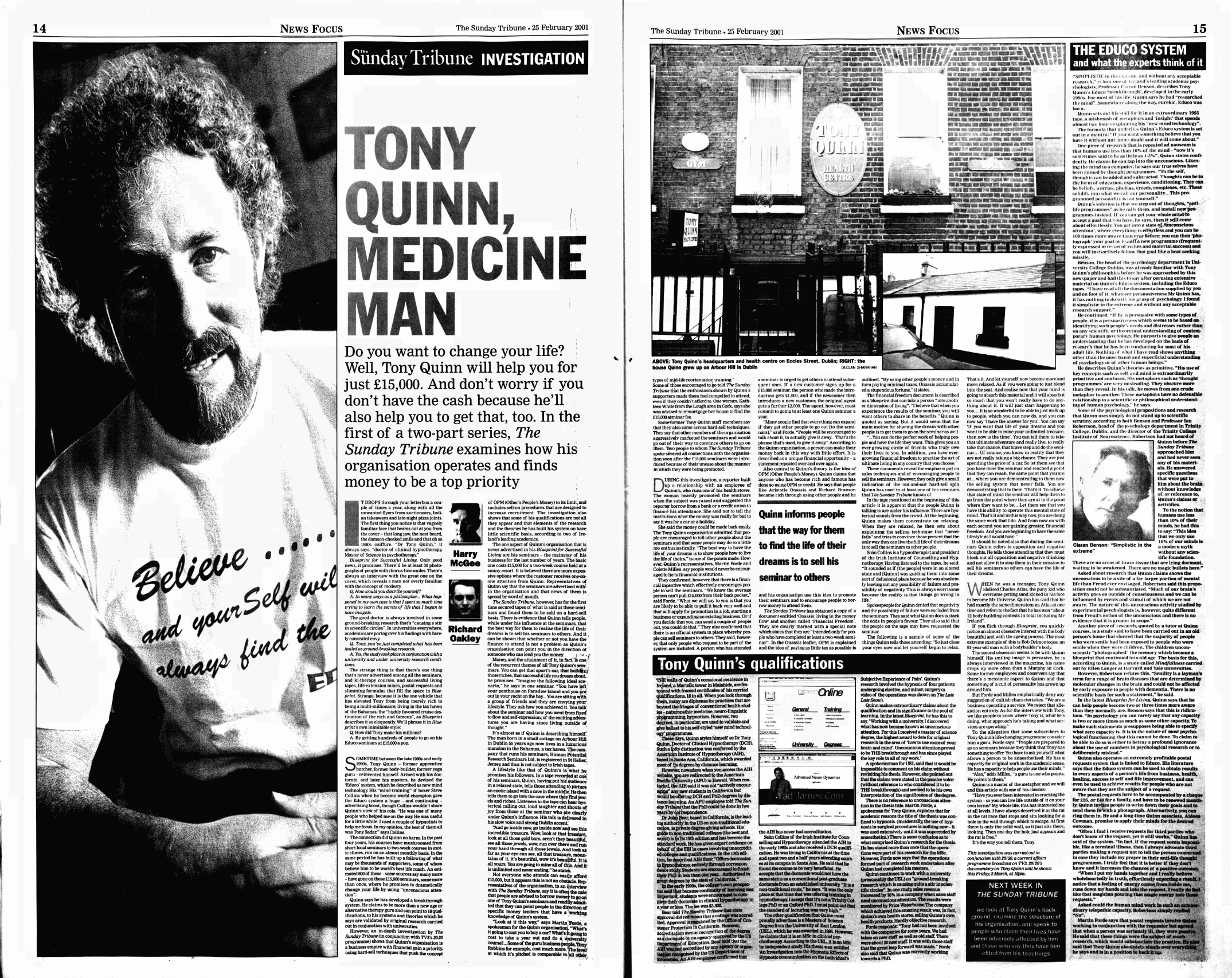"Tony Quinn, Medicine Man", Sunday Tribune
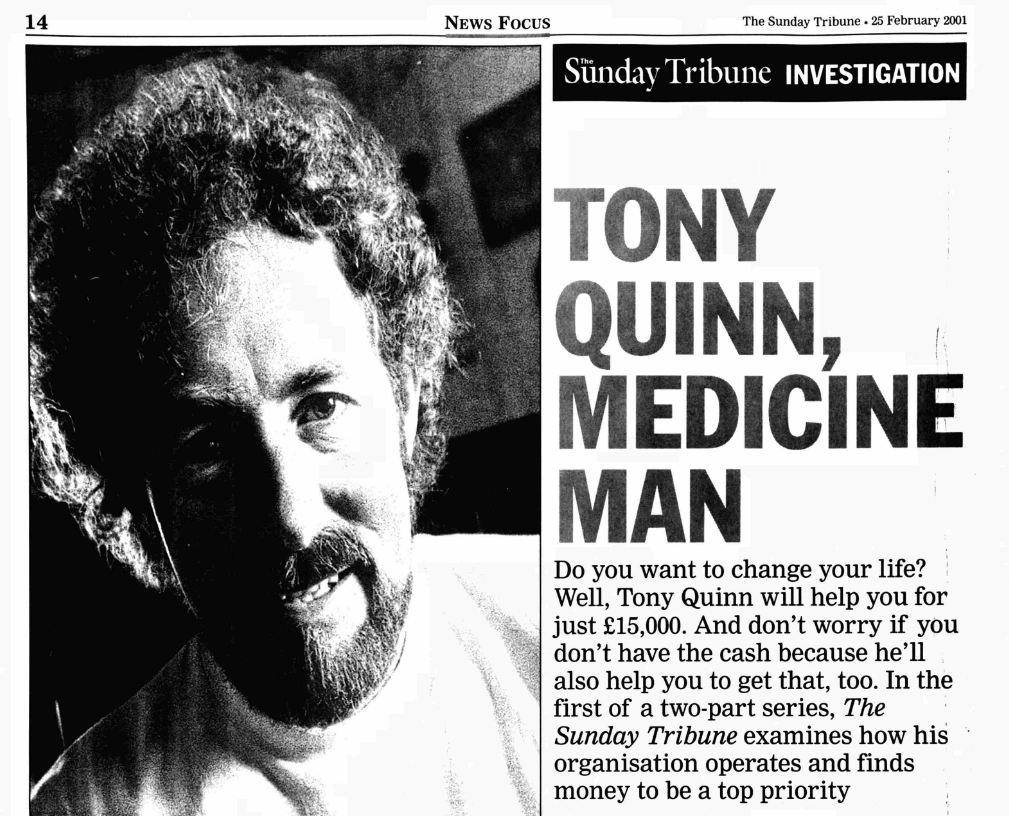
Do you want to change your life? Well, Tony Quinn will help you for just £15,000. And don't worry if you don't have the cash because he'll also help you to get that, too. In the first of a two-part series, The Sunday Tribune examines how his organisation operates and finds money to be a top priority
By Harry McGee and Richard Oakley
IT DROPS through your letterbox a couple of times a year, along with all the unwanted flyers from auctioneers, Indian takeaways and late-night pizza joints. The first thing you notice is that vaguely familiar face that beams out at you from the cover - that long jaw, the neat beard, the damson-cheeked smile and that oh so 1980s coiffure. "Dr Tony Quinn," it always says, "doctor of clinical hypnotherapy, Master of Science in psychotherapy."
Blueprint for Successful Living. Only good news, it promises. There'll be at least 30 photographs of people with chorus-line smiles. There's always an interview with the great one on the cover, which reveals a man not overly familiar with the concept of modesty.
- How would you describe yourself?
- In many ways as a philosopher.. What happened in my own case is that I spent so much time trying to learn the secrets of life that I began to have insights.
The good doctor is always involved in some ground-breaking research that's "causing a stir in scientific circles". In universities everywhere, academics are poring over his findings with barely concealed envy.
- Tony, you've just completed what has been hailed as ground-breaking research.
- Yes, the study took place in conjunction with a university and under university research conditions.
The strange thing is that there's one thing that's never advertised among all the seminars, and ki-therapy courses, and successful living tapes, life-extension mixes, postal requests and slimming formulas that fill the space in Blueprint. Strange, because it is the one vehicle that has elevated Tony from being merely rich to being a multi-millionaire, living in the tax haven of the Bahamas, the "highly favoured cruise destination of the rich and famous", as Blueprint describes it so eloquently. We'll phrase it in Blueprint's own inimitable style:
- How did Tony make his millions?
- By getting hundreds of people to go on his Educo seminars at £15,000 a pop.
SOMETIME between the late 1980's and early 1990's, Tony Quinn - former apprentice butcher, former body-builder, former yoga guru - reinvented himself. Armed with his doctorate, and later his masters, he devised the 'Educo' system, which he described as new mind technology. His "mind-training" of boxer Steve Collins when he became world champion gave the Educo system a huge - and continuing - advertising boost, though Collins wouldn't share Quinn's view of his role. "He was one of many people who helped me on the way. He was useful for a little while. I used a couple of hypnotists to help me focus. In my opinion, the best of them all was Tony Sadar," says Collins.
The connection did Quinn no harm. In the past four years, his courses have mushroomed from short local seminars to two-week courses in exotic climes, run on an almost monthly basis. In the same period he has built up a following of what may be thousands of supporters, some of whom believe him to be world's best life coach. An estimated 600 of these - some sources say many more - have gone on these £15,000 seminars, some more than once, where he promises to dramatically change your life by using "unconscious attention".
Quinn says he has developed a breakthrough system. He claims to be more than a new age or alternative therapy guru and can point to 18 qualifications, to his systems and theories which he says are validated by original research carried out in conjunction with universities.
However, an in-depth investigation by The Sunday Tribune (in conjunction with TV3's 20-20 programme) shows that Quinn's organisation is a business empire with financial gain a priority, using hard-sell techniques that push the concept of OPM (Other's People's Money) to its limit, and includes sell-on procedures that are designed to increase recruitment. The investigation also shows that some of his qualifications are not all they appear and that elements of the research and the theories he has built his system on have little scientific basis, according to two of Ireland's leading academics.
The one aspect of Quinn's organisation that is never advertised in his Blueprint for Successful Living are his seminars - the mainstay of his business for the last number of years. The basic one costs £15,000 for a two-week course held at a sunny resort. It is believed there are more expensive options where the customer receives one-on-one attention from Quinn. Representatives of Quinn say that the seminars are advertised within the organisation and that news of them is spread by word of mouth.
The Sunday Tribune, however, has for the first time secured tapes of what is said at these seminars and found them to be sold on a hard-sell ' basis. There is evidence that Quinn tells people, while under his influence at the seminars, that the best way for them to realise the life of their dreams is to sell his seminars to others. And it can be shown that whether or not you have the finance to attend is not a problem as Quinn's organisation can point you in the direction of someone who can lend you the money.
Money, and the attainment of it, in fact, is one of the recurrent themes of all Tony Quinn's seminars. You can get that sport's car, that holiday, those riches, that successful life you dream about, he promises. "Imagine the following ideal scenario," he says in one seminar. "You have left your penthouse on Paradise Island and you are out in your yacht on the bay.. You are sitting with a group of friends and they are envying your lifestyle. They ask how you achieved it. You talk about the seminar and how you went from fixed to flow and self-expression; of the exciting adventures you are having since living outside of thought."
It's almost as if Quinn is describing himself: The man born in a small cottage on Arbour Hill in Dublin 55 years ago now lives in a luxurious mansion in the Bahamas, a tax haven. The company that runs his seminars, Human Potential Research Seminars Ltd, is registered in St Helier, Jersey, and thus is not subject to Irish taxes.
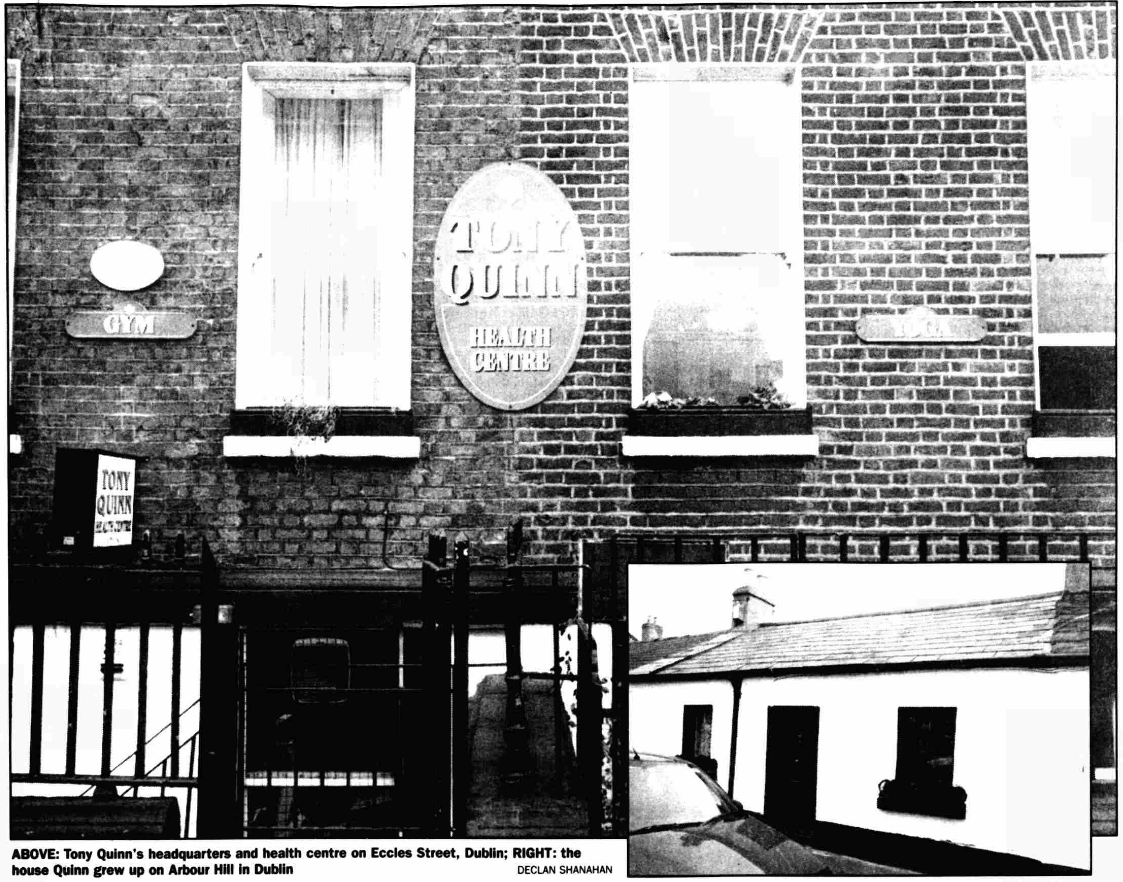
A lifestyle like that of Quinn's is what he promises his followers. In a tape recorded at one of his seminars, Quinn, having put his audience in a relaxed state, tells those attending to picture an exotic island with a cave in the middle. He then tells them to go into the cave where they find jewels and riches. Listeners to the tape can hear hysterical calling out, loud laughter and shouts of joy from those at the seminar who are clearly under Quinn's influence. His talk is delivered in his slow voice and strong Dublin accent.
"And go inside now, go inside now and see this incredible treasure. Wow, look at that treasure, look at all those gold bars, aren't they beautiful, see all those jewels, wow, run over there and run your hand through all those jewels. And look as far as your eye can see, all that treasure, mountains of it, it's beautiful, wow it's beautiful. It is all yours. You are going to mine all of this. And it is unlimited and never ending," he states.
Not everyone who attends can easily afford £15,000, but it appears this is not an obstacle. Representatives of the organisation, in an interview with The Sunday Tribune, say it is often the case that people are advised to borrow money to go on one of Tony Quinn's seminars and readily admitted that they can point people in the direction of specific money lenders that have a working knowledge of Quinn's system.
"Look at it this way," says Martin Forde, a spokesman for the Quinn organisation. "What's it going to cost you to buy a car? What's it going to cost to take a year out and do a university course?... Some of the guru business people, Tony Robbins for example, cost much more. The level at which it's pitched is comparable to all other types of mid-life reorientation training."
Some of those encouraged to go told The Sunday Tribune that the enthusiasm shown by Quinn's supporters made them feel compelled to attend, even if they couldn't afford to. One woman. Kathleen White from the Lough area in Cork, says she was advised to remortgage her house to find the £15,000 seminar fee.
Some former Tony Quinn staff members say that they also came across hard-sell techniques. They say that other members of the organisation aggressively marketed the seminars and would go out of their way to convince others to go on them. Two people to whom The Sunday Tribune spoke severed all connections with the organisation soon after the £15,000 seminars were introduced because of their unease about the manner in which they were being promoted.
DURING this investigation, a reporter built up a relationship with an employee of Quinn's, who runs one of his health stores. The woman heavily promoted the seminars when the subject was raised and suggested the reporter borrow from a bank or a credit union to finance his attendance. She said not to tell the institutions what the money was really for but to say it was for a car or a holiday.
She said the money could be made back easily. The Tony Quinn organisation admitted that people are encouraged to tell other people about the seminars and that some people may do so a little too enthusiastically. "The best way to have the life of your dreams is to show people how to live the life of theirs," is one of the points made. However, Quinn's representatives, Martin Forde and Colette Millea, say people would never be encouraged to lie to financial institutions.
They confirmed, however, that there is a financial incentive which effectively encourages people to sell the seminars. "We know the average person can't pull £15,000 from their back pocket," said Forde. "What we will say to you is that you are likely to be able to pull it back very well and that will apply for promotion in a job, starting a business or expanding an existing business. Or if you decide that you can send a couple of people out, you could do that." They also confirmed that there is an official system in place whereby people can sell seminars to others. They said, however, that only people who request to be part of the system are included. A person who has attended a seminar is urged to get others to attend subsequent ones. If a new customer signs up for a £15,000 seminar, the person who made the introduction gets £1,000, and if the newcomer then introduces a new customer, the original agent gets a further £2,000. The agent, however, must commit to going to at least one Quinn seminar a year.
"Many people find that everything can expand if they get other people to go out [to the seminars]," said Forde. "People will be encouraged to talk about it, to actually give it away.. That's the phrase that's used, to give it away" According to the Quinn organisation, a person can make their money back in this way with little effort. It is described as a unique financial opportunity - a statement repeated over and over again.
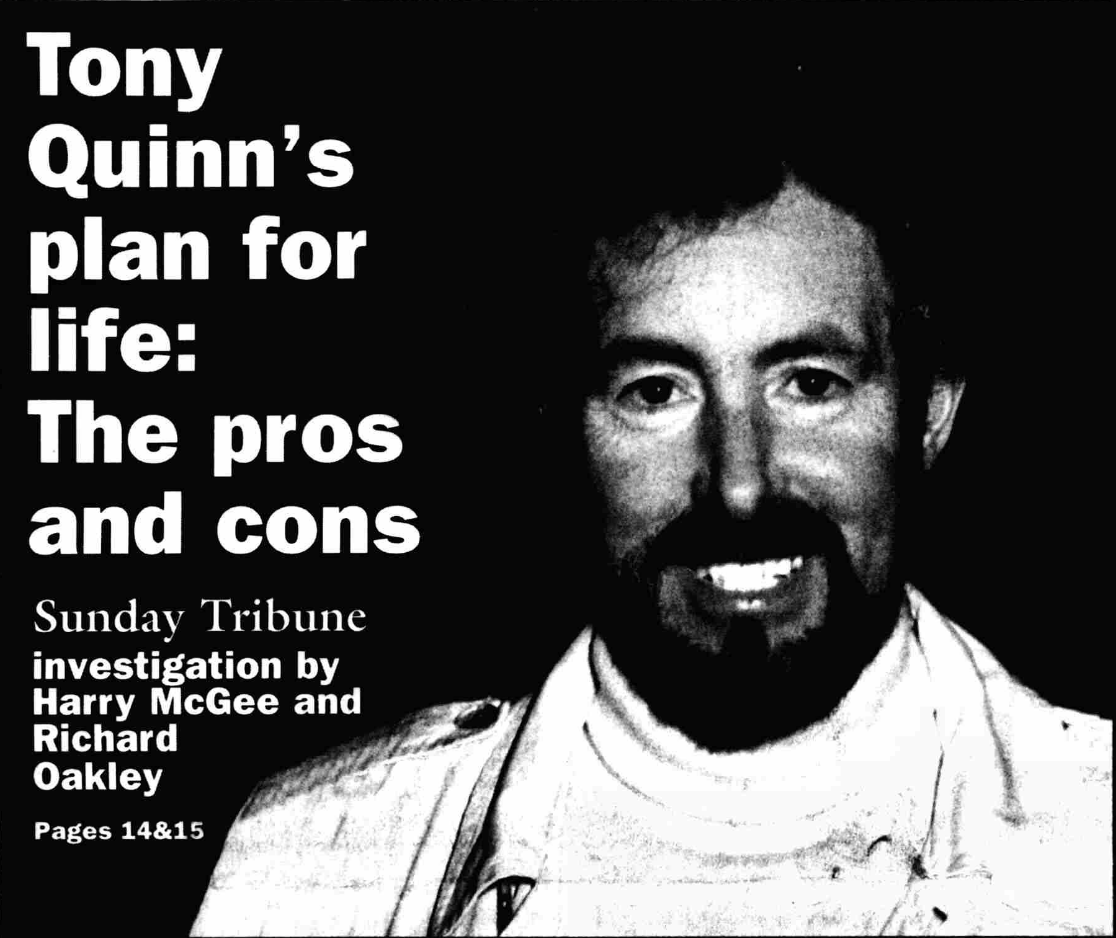
Quinn informs people that the way for them to find the life of their dreams is to sell his seminar to others
Also central to Quinn's theory is the idea of OPM (Other People's Money). Quinn claims that anyone who has become rich and famous has done so using OPM or credit. He says that people like Aristotle Onassis and Richard Branson became rich through using other people and he and his organisation use this idea to promote their seminars and to encourage people to borrow money to attend them.
The Sunday Tribune has obtained a copy of a document entitled 'Onassis: living in the money flow' and another called 'Financial Freedom'. They are clearly marked with a special note which states that they are "intended only for people who have completed at least a two-week seminar". In the Onassis leaflet, OPM is explained and the idea of paying as little tax as possible is outlined. "By using other people's money and in turn paying minimal taxes, Onassis accumulated a stupendous fortune," it states.
The financial freedom document is described as a blueprint that can take a person "into another dimension of living". "I believe that when you experience the results of the seminar, you will want others to share in the benefits," Quinn is quoted as saying. But it would seem that the main motive for sharing the dream with other people is to get them to go on the seminar as well.
"...You can do the perfect work of helping people and have the life they want. This gives you an ever-growing circle of friends who truly owe their lives to you. In addition, you have evergrowing financial freedom to practise the art of ultimate living in any country that you choose."
These documents reveal the emphasis put on sales techniques and of encouraging people to sell the seminars. However, they only give a small indication of the out-and-out hard-sell spin Quinn has used in at least one of his seminars that The Sunday Tribune knows of.
In the tape mentioned at the beginning of this article it is apparent that the people Quinn is talking to are under his influence. There are hysterical sounds from the crowd. At the beginning, Quinn makes them concentrate on relaxing. When they are relaxed, he then sets about explaining the selling technique that "never fails" and tries to convince those present that the only way they can live the full life of their dreams is to sell the seminars to other people.
Sean Collins is a hypnotherapist and president of the Irish Institute of Counselling and Hypnotherapy. Having listened to the tapes, he said: "It sounded as if [the people] were in an altered state and [Quinn] was guiding them into some sort of delusional place because he was absolutely leaving out any possibility of failure and possibility of negativity. This is always worrisome because the reality is that things go wrong in life."
Spokespeople for Quinn denied that negativity and the possibility of failure were excluded from the seminars. They said what Quinn does is stack the odds in people's favour. They also said that the people on the tape may have requested the seminar.

The following is a sample of some of the things Quinn tells those attending "So just dose your eyes now and let yourself begin to relax. That's it. And let yourself now become more and more relaxed. As if you were going to just blend into the seat. And realise now that your mind is going to absorb this material and it will absorb it so much that you won't really have to do anything about it. It will just start happening to you... It is so wonderful to be able to just walk up to people, which you can now do, and you can now say 'I have the answer for you'. You can say 'lf you want that life of your dreams and you want to be able to mine your unlimited treasure, then now is the time'. You can tell them to take that ultimate adventure and really live, to really take that chance, that brave step and do the seminar... Of course, you know in reality that they are not really taking a big chance. They are just spending the price of a car. So let them see that you have done the seminar and reached a point that they can reach, the same point that you are at... where you are demonstrating to them now the selling system that never fails. You are demonstrating that to them. That's it. To achieve that state of mind the seminar will help them to go from the point where they are at to the point where they want to be... Let them see that you have this ability to operate this mental state of mind. That's it and in this way now, you are doing the same work that I do. And from now on with each second you are gaining greater, financial freedom. And you are beginning to have the same lifestyle as I would have."
It should be noted also that during the seminars Quinn refers to opposition and negative thoughts. He tells those attending that they must block out all opposition and negative thinking and not allow it to stop them in their mission to sell his seminars so others can have the life of their dreams.
WHEN he was a teenager, Tony Quinn idolised Charles Atlas, the puny kid who overcame getting sand kicked in his face to become Mr Universe. Quinn has said that he had exactly the same dimensions as Atlas at one time and refers to the fact that he has won "about 12 body-building contests in total including Mr Ireland".
If you flick through Blueprint, you quickly notice an almost obsessive interest with the body beautiful and with the ageing process. The most extreme example of this is Bob Delmonteque. an 81-year-old man with a bodybuilder's body.
The second obsession seems to be with Quinn himself. His smiling image is pervasive, he is always interviewed in the magazine, his name crops up more often than a Murphy in Cork. Some former employees and observers say that there's a messianic aspect to Quinn and that something of a cult of personality has grown up around him.
But Forde and Millea emphatically deny any suggestion of cultish characteristics. "We are a business operating a service. We reject that allegation entirely. As for the interview with Tony, we like people to know where Tony is, what he's doing, what approach he's taking and what services are operating."
To the allegation that some subscribers to Tony Quinn's life-changing programme consider him a guru, Forde says: "People are prepared to go on seminars because they think that Tony has something to offer. You have to ask yourself what allows a person to be anaesthetised. He has a capacity for original work in the academic sense. He has a capacity to help people use their minds."
"Also," adds Millea, "a guru is one who points. He points to them."
Quinn is a master of the metaphor and we will end this article with one of his classics:
"Have you ever been interested in cracking the system - so you can live life outside of it on your own terms? My whole life, this has interested me at all levels. I have always described it as the rat in the rat race that stops and sits looking for a hole in the wall through which to escape. At first there is only the solid wall, so it just sits there, looking. Then one day the hole just appears and the rat is free."
It's the way you tell them, Tony.
This investigation was carried out in conjunction with 20/20, a current affairs programme broadcast on TV3. 20/20's documentary on Tony Quinn will be shown this Friday, 2 March, at lOpm.
Tony Quinn's qualifications
THE walls of Quinn's occasional residence in Ireland, a Martello tower in Malahide, are festooned with framed certificates of his myriad qualifications, 18 in all. When you look through them, many are diplomas for practices that are beyond the fringes of conventional health studies naturopathic medicine, neuro-linguistic programming, hypnotism. However, two degrees, in particular, are used to validate and give ballast to his self-styled 'new mind technology' programmes.
These days, Quinn styles himself as Dr Tony Quinn, Doctor of Clinical Hypnotherapy (DCH). Such a lofty distinction was conferred by the American Institute of Hypnotherapy (AIH), based in Santa Ana, California, which awarded most of its degrees by distance learning.
However nowadays when you access the AIH website, you are redirected to the American Pacific University (APU) in Hawaii. When contacted, the AIH said it was not "actively encouraging" any new students in California but would be offering DCH and PhD degrees by distance learning. An APU employee told The Sunday Tribune that the PhD could be done in two years by correspondence.
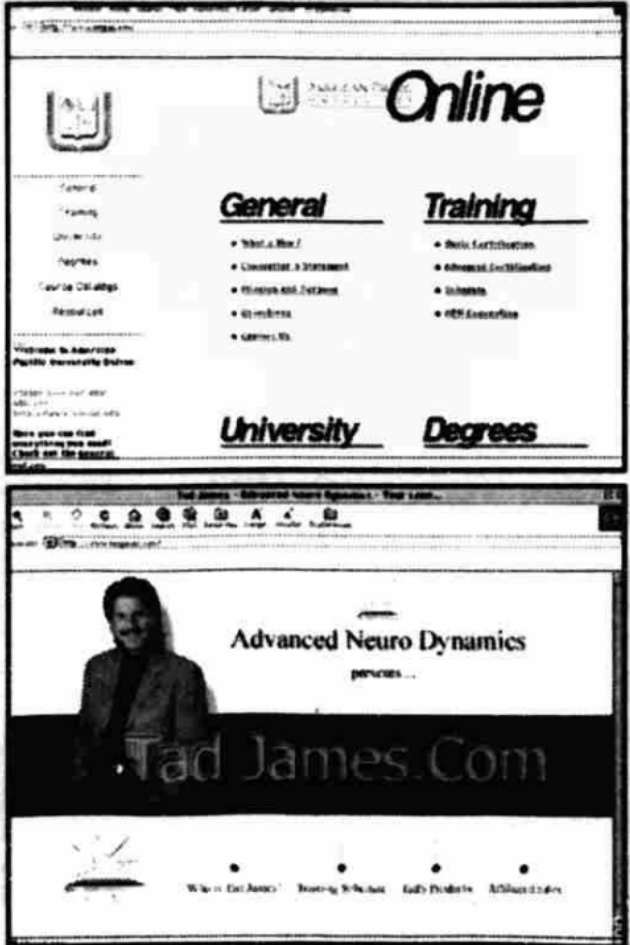
Dr John Bear, based in California, is the leading authority in the US on non-traditional education, i.e. private degree-giving schools. His guide to non-traditional colleges (the best and worst) is in its 13th edition and has become the standard work. He has given expert evidence on behalf of the FBI in cases involving unaccredited colleges and qualifications. In the 10th edition, he described AIH thus: "Offers doctorates in hypnotherapy, entirely through correspondence study. Students are encouraged to finish their PhD in less than one year... Authorised to grant degrees by the state of California."
In the early 1990s. the college's own prospectus said that because continuity of learning was important, students were encouraged to complete their doctorate in clinical hypnotherapy in a year or less. The fee was $3,300.
Bear told The Sunday Tribune that state approval did not mean that a college was accredited. Approval is regulated by the Office of Consumer Protection in California. However, accreditation means recognition of the degree as a doctorate by an agency approved by the US Department of Education. Bear said that the AIH was not accredited by any agency or organisation recognised by the US Department of Education. An AIH employee confirmed that the AIH has never had accreditation.
Sean Collins of the Irish Institute for Counselling and Hypnotherapy attended the AIH in the early 1990s and also received a DCH qualification. He was living in California at the time and spent two and a half years attending courses at its campus in Santa Ana. He said that he found the course to be very beneficial. He accepts that the doctorate would not have the same status as a conventional post-graduate doctorate from an established university. "It is a non-traditional route," he says. "It was the only place at that time that was offering training in hypnotherapy. I accept that it's not a Trinity College PhD or an Oxford PhD. I must point out that the standard of lecturing was very high."
The other qualification that Quinn most proudly advertises is a Masters of Science Degree from the University of East London (UEL). which he was awarded in 1995. However, he claims that it is an MSc in clinical psychotherapy. According to the UEL, it is an MSc by independent study. His thesis was entitled 'An Investigation into the Hypnotic Effects of Hypnotic communication on the Individual's Subjective Experience of Pain'. Quinn's research involved the hypnosis of four patients undergoing elective, and minor, surgery (a video of the operations was shown on The Late Late Show).
Quinn makes extraordinary claims about the qualification and its significance to the pool of learning. In the latest Blueprint, he has this to say. "Working with a university I discovered what has now become known as unconscious attention. For this I received a master of science degree, the highest award to date for original research in the area of 'how to use more of your brain and mind'. Unconscious attention proved to be THE breakthrough and has since played the key role in all of my work.'
A spokeswoman for UEL said that it would be impossible to comment on his claim without revisiting his thesis. However, she pointed out that the claims were stated in the passive voice (without reference to who considered it to be THE breakthrough) and seemed to be his own interpretation of the significance of the degree.
There is no reference to unconscious attention in the thesis title. Martin Forde, a spokesman for Tony Quinn, explains that for academic reasons the title of the thesis was confined to hypnosis. (Incidentally, the use of hypnosis in surgical procedures is nothing new - it was used extensively until it was superseded by anaesthetics.) There is some confusion as to what comprised Quinn's research for the thesis. He has stated more than once that the operations were part of his research for the MSc. However, Forde now says that the operations formed part of research work undertaken after Quinn had completed his masters.
Quinn continues to work with a university (presumably the UEL) on "ground-breaking research which is causing quite a stir in scientific circles". In one study, sales revenue increased by 70% in a company when sales staff used unconscious attention. The results were monitored by Price Waterhouse. The company which achieved this amazing result was, in fact, Quinn's own health stores, selling Quinn's own health products. Hardly objective research.
Forde responds: "Tony had not been involved with the companies for some years. We had taken on new staff as well as old staff. There were about 20 new staff. It was with those staff that the great leap forward was made." Forde also said that Quinn was currently working towards a PhD.
THE EDUCO SYSTEM and what the experts think of it
"SIMPLISTIC in the extreme and without any acceptable research," is how one of Ireland's leading academic psychologists, Professor Ciaran Benson. describes Tony Quinn's Educo 'breakthrough', developed in the early 19905. For most of his life. Quinn says he had "researched the mind". Somewhere along the way, eureka!, Educo was born.
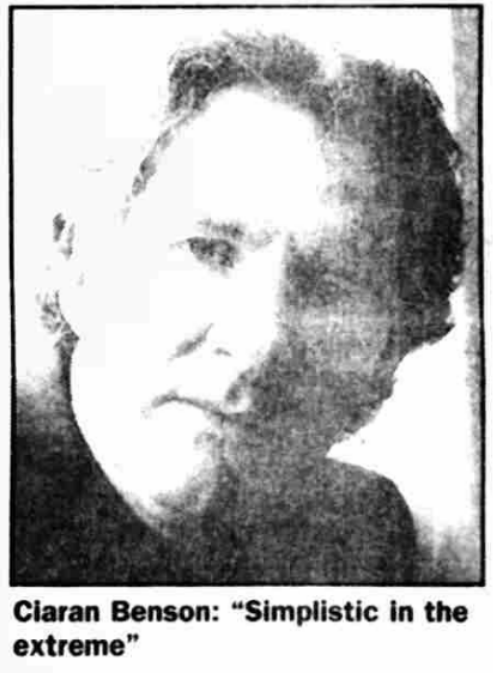
Quinn sets out his stall for it in an extraordinary 1993 tape, a mishmash of metaphors and 'insight' that spends almost two hours explaining his "new mind technology".
The formula that underlies Quinn's Educo system is set out in a mantra: "If you want something believe that you have it without any inner doubt and it will come about."
One piece of research that is repeated ad nauseam is that humans use less than 10% of the mind - "now it's sometimes said to be as little as 1-3%", Quinn states confidently. He claims he can tap into the unconscious. Likening the mind to a computer, he says our true selves have been ruined by thought programmes. "To the self. thoughts can be added and subtracted. Thoughts can be in the form of education, experience, conditioning. They can be beliefs, worries, phobias, creeds, complexes, etc. These solidify into what we call our personality... This programmed personality is not yourself."
Quinn's solution is that we step out of thoughts. "anti-life programmes" as he calls them, and install new programmes instead. If you can get your whole mind to accept a goal that you have, he says, then it will come about effortlessly. You get into a state of 'Unconscious attention'. where everything is effortless and you can be 100 times more aware than ever before; you can then 'photograph' your goal or install a new programme (frequently expressed in terms of riches and material success) and you will instinctively follow that goal like a heat-seeking missile.
Benson, the head of the psychology department in University College Dublin, was already familiar with Tony Quinn's philosophies before he was approached by this newspaper and had this to say after perusing extensive material on Quinn's Educo system, including the Educo tapes. "I have read all the documentation supplied by you and on foot of it, whatever persuasiveness Mr Quinn has, it has nothing to do with his grasp of psychology. I found it simplistic in the extreme and without any acceptable research support."
He continued: "If he is persuasive with some types of people. it is a persuasiveness which seems to be based on identifying such people's needs and distresses rather than on any scientific or theoretical understanding of contemporary human psychology. He purports to give people an understanding that he has developed on the basis of research that he has been conducting for most of his adult life. Nothing of what I have read shows anything other than the most banal and superficial understanding of psychology or of other human beings."
He describes Quinn's theories as primitive. "His use of key concepts such as self and mind is extraordinarily primitive and confused. His metaphors such as 'thought programmes' are very misleading. They obscure more than they reveal. In his talk, he moves from one crude metaphor to another. These metaphors have no defensible relationship to a scientific or philosophical understanding of human psychology," he says.
Some of the psychological propositions and research that Quinn uses simply do not stand up to scientific scrutiny, according to both Benson and Professor lan Robertson, head of the psychology department in Trinity College. Dublin, and the director of the Trinity College Institute of Neuroscience. Robertson had not heard of Quinn before The Sunday Tribune approached him and had never seen any of his materials. He answered specific questions that were put to him about the brain without knowledge of. or reference to, Quinn's claims or activities.
To the notion that humans use less than 10% of their minds, he had this to say: "This idea that we only use 10% of our minds is a modern myth without any scientific foundation. There are no areas of brain tissue that are lying dormant, waiting to be awakened. There are no magic bullets here."
Asked about research that Quinn claims shows the unconscious to be a site of a far larger portion of mental life than Freud ever envisaged, Robertson said this proposition could not be substantiated. "Much of our brain's activity goes on outside of consciousness and we can be influenced by events and stimuli of which we are not aware. The nature of this unconscious activity studied by experimental psychologists is, however, quite different from Freud's notion of the unconscious and there is no evidence that it is greater in scope."
Another piece of research, quoted by a tutor at Quinn courses, is a study said to have been carried out in an old person's home that showed that the majority of people who were senile had been exposed to people who were senile when they were children. The children unconsciously "photographed" the memory which became a blueprint that continued into old age. The basis for this, according to Quinn. is a study called Mindfullness carried out by Ellen Langer at Harvard and Yale universities.
However, Robertson refutes this. "Senility is a layman's term for a range of brain diseases that are determined by molecular changes in the brain and could not be affected by early exposure to people with dementia. There is no scientific basis for such a statement," he said.
In the latest Blueprint for Living, Quinn says that he can help people become two or three times more aware than they normally are. Benson says that this is ridiculous. "In psychology you can rarely say that any capacity is two or more times as much as some other capacity. To make such statements presupposes being able to specify what zero capacity is. It is in the nature of most psychological functioning that this cannot be done. To claim to be able to do so is either to betray a profound ignorance about the use of numbers in psychological research or to deliberately mislead."
Quinn also operates an extremely profitable postal requests system that is linked to Educo. His literature says that the Educo system can be used to obtain results in every aspects of a person's life from business, health, healing, success to self and life improvement, and can even be used to achieve results for people who are not aware that they are the subject of a request.
The postal requests have to be accompanied by a cheque for £25, or £40 for a family, and have to be renewed monthly. Quinn invites people to write down their goals and to send them with a photograph. Alternatively, you can ring them in. He and a long-time Quinn associate, Aideen Cowman, promise to apply their minds for the desired outcome.
"Often I find I receive requests for third parties who don't know of the request, yet it still works," Quinn has the system. "In fact, if the request seems impossible, like a terminal illness, then I always advocate third making a request not to tell the person concerned in their anti-life thought programmes. I truly feel that it is better if they don't and it increases the chances of a positive outcome.
When I put my hands together and I really believe wholeheartedly in truth, effortlessly expecting a result. I that a feeling of energy comes from inside me, runs down my hands and into the request. I really do feel like that magician pouring that magic energy into those requests."
Asked could the human mind work in such an extraordrinary telepathic capacity, Robertson simply replied "No".
Martin Forde says that postal requests involve Quinn working in conjunction with the requester but agreed that when a person was seriously ill, they were passive. He said that these things were the subject of much research, which would substantiate the practice. He also said that Tony Quinn absolutely stands over everything he says and is in a position to back it up.
NEXT WEEK IN THE SUNDAY TRIBUNE
We look at Tony Quinn's background, examine the structure of his organisation, and speak to people who claim their lives have been adversely affected by him and those who say they have benefited from his teachings.
